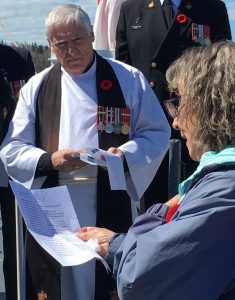
She clutched the folded papers in her hands for quite some time. When the officer on board HMCS Sackville called upon her, she knew it was her turn to speak. Then, though unaccustomed to public speaking, Catherine Wilson stepped forward in front of the warship’s company and other civilians assembled there, unfolded the speech, and began:
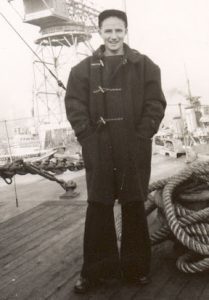
“My father, John Wallace Potter – better known as Potts – was born on March 10, 1922, in Toronto,” she said. “It took him three attempts to enlist before the Royal Canadian Navy finally accepted him in May 1941.”
Catherine stood on the aft deck of HMCS Sackville, last Sunday, as this former fighting ship, one of only two remaining Canadian Second World War warships still afloat, performed an annual ritual. Each year on the first Sunday of May – called Battle of the Atlantic Sunday – Sackville takes families of deceased veterans to sea for the spreading of their ashes.
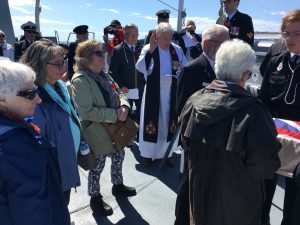
It’s often the final request of Royal Canadian Navy and Canadian Merchant Navy veterans (even those who served after the famous Battle of the Atlantic that ended in May 1945). Invited to join observances bout the climax of this victory over Nazi Germany’s U-boat wolf-pack attacks against Allied convoys to Britain during the war, I watched all 19 families, including John Potter’s family, say goodbye.
All week the weather in Halifax had threatened with gloomy overcast, drizzle and blustery cold winds. But as Catherine and the other families – one-by-one – paid tribute to their loved ones with biographical stories on the afterdeck of Sackville, the 200-foot-long, battle-worn corvette rocked gently on calm Atlantic waters in bright sunshine and a pleasant offshore breeze.
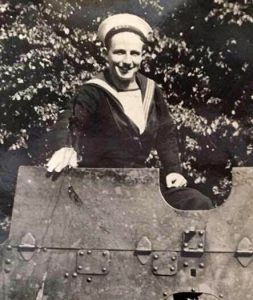
“Dad was one of the original crew of HMCS Regina (another member of Canada’s corvette navy during WWII),” Catherine Wilson continued.
Transferred for a short while to the Mediterranean, Regina escorted troopships and merchant ships to North Africa during Operation Torch in 1943. That’s when telegraphist John Potter and his shipmates sank enemy U-boat Avorio off the coast of Algeria. Potter told his daughters that when the Italian crewmen were captured, he remembered them gloating about going to PoW camps away from the war in North America.
“We’re going to Canada,” said one of the prisoners. “You’re staying here.”
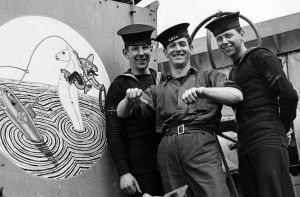
The Nazi-allied Italians wouldn’t have known it, but Potter and his shipmates became heroes of Operation Torch. In a liberated Algiers, Royal Navy Vice-Admiral Lord Louis Mountbatten, chief of combined Allied operations, complimented the Canadian sailors by saying of them “they’re a bloody tough-looking bunch of bastards.”
Even better for HMCS Regina’s sailors, the City of Regina, whose citizens had helped fund the building of the ship, had also offered a prize if the corvette sank an enemy sub. With the sinking of Avorio, Potter would have shared in that modest but pride-inspiring purse.
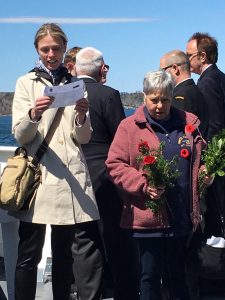
Aboard Sackville Sunday afternoon, the stories continued to flow from the eulogies of proud veteran offspring. Iain Parker and his family recounted the volunteer service of Quartermaster Petty Officer Reg A. Parker before committing his ashes to Atlantic. So did Shannon Smale remember her uncle Chief Petty Officer Joseph Brett Smale.
Merchant Navy veterans who’d passed were also recognized for their service; the Conrick family travelled from Calgary to remember merchant sailor Thomas William Conrick, while the offspring of Master Mariner Angus McDonald and his wife Mary committed the ashes of both parents from Sackville.
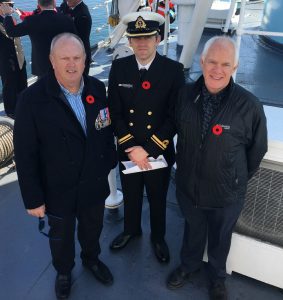
Wearing a multitude of Navy service medals himself, Tom Adderson joined his brother and nephew aboard Sackville to remember the patriarch of the family, his father Lt. Commander John William Adderson. Brimming with pride but tearing up too, Tom described his father growing up during the Depression in Winnipeg, but that he left the Prairies for Victoria and served in a dozen different ships between 1948 and 1981.
The elder Adderson served in the Korean War and helped with the refit of HMCS Kootenay following a devastating explosion in her engine room that killed nine Canadian sailors and injured 53 others in 1969.
“Somehow,” Tom Adderson said finally, “he and Mom managed a brood of five children and a litany of grand- and great-grandchildren.”
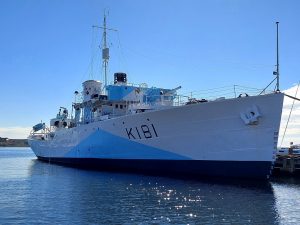
As Catherine Wilson completed her tribute to her dad, John Potter the telegraphist from HMCS Regina, she said when people thanked her father for his service during the Second World War, he said he never considered himself a hero. “I just grew up in the Navy,” he told her.
Then, just before her father’s ashes were committed to Atlantic waters, she quoted her niece Brenda. “With the passing of Uncle Jack and the Queen (Elizabeth,)” she said, “we’re at the end of an era.”
What a lovely tribute to the veterans and their families onboard HMCS Sackville during the remembrance of the Battle of the Atlantic. As I read the column, I felt as though I too was standing on the weather deck amongst the families left behind and found myself tearing up. Mr. Barris it was a pleasure to read about your experiences that day and thank you for continuing to give those who no longer have a voice, a chance to share their story and live on in our memories.
What a beautiful tribute to Unxle Jack Potter.